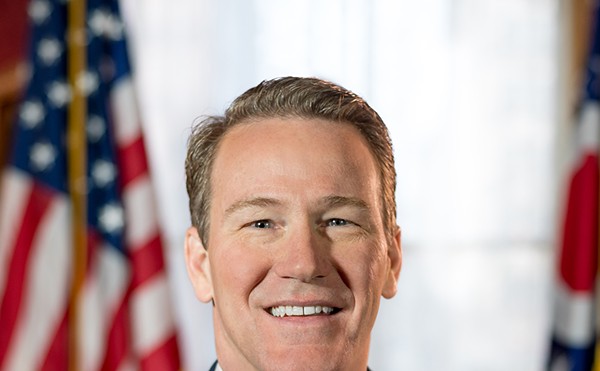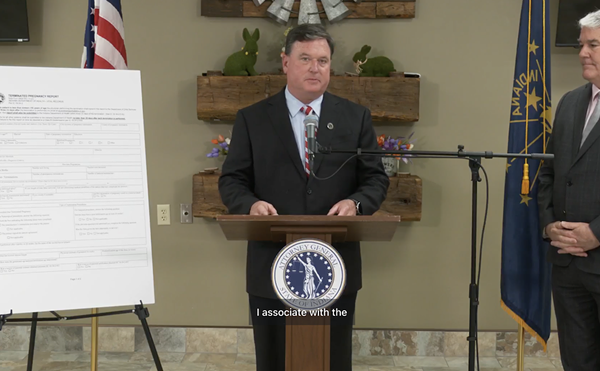At the age of 14, three years before he ever sat behind a kit or held a drumstick in his hand, John Von Ohlen became a drummer.
He'd already been playing classical piano for a decade and trombone for half that long when he attended a Stan Kenton concert at some forgotten ballroom in his Indianapolis hometown in 1955 and witnessed the fluid brilliance of Kenton's gifted skinsman Mel Lewis. The event transformed him.
"I didn't know anything about drums or even think about them, but when I saw Mel Lewis that night the next day when I woke up, in my head, I was a drummer," says Von Ohlen, whose career as one of the most gifted Jazz drummers in the city and as the co-founder of the legendary Blue Wisp Big Band has earned him the Michael W. Bany Lifetime Achievement Award and induction into the Cincinnati Entertainment Awards Hall of Fame. "From then on, I was hooked."
With few family resources, Von Ohlen's drum dream remained well out of reach until fate took a hand and delivered him a brand new Gretsch Jazz set by way of a friend.
"All of a sudden, he went into the Navy," Von Ohlen says. "So he said, 'Why don't you take the set and pay me $12 a month?' So I had a great new set."
Von Ohlen was so smitten with his newfound love that he began cutting classes in order to stay home and practice.
After his parents left for work, he pretended to go to school then doubled back to practice on his kit with the family stereo blaring.
"Honest to God, I cut school big time," Von Ohlen says with a laugh. "I didn't go to school. You won't believe this, but it's true. I've got the hi-fi as loud as it'll go and I'm playing the drums all day long, and the whole family that lived next door to us was deaf. We lived very near the deaf school in Indianapolis, and the whole family went there. Was that an omen or what?"
With his relentless practice schedule, Von Ohlen's success was a matter of time. It was his father who noticed his progression.
"My dad would hear me play at night when he got home from work," Von Ohlen says. "He never played himself, but he's got a pretty good ear. He said, 'For the first few months, I didn't know what you were doing in there. It just didn't make it. One night, you were playing and all of a sudden it sounded good. It was really overnight.' I just kept playing until it clicked. I taught myself. I never took lessons. For a long time I couldn't use the high hat. I didn't know what to do with it."
After taking over for the mediocre drummer in his school Jazz band, Von Ohlen finally graduated from high school and attended the prestigious Jazz school at North Texas State University. In addition to classes, he lined up working gigs with local bands, a form of minor league work experience that he bemoans as being lost to today's young Jazz players.
"I tell my students it's a shame we don't have that natural system," Von Ohlen says. "Instead of going to school, you'd start working. It's different than school."
After a year-and-a-half stint with Ralph Marterie and a two-year stretch in the Army (where he continued to play in a stateside Showmobile), Von Ohlen returned to Indianapolis as a supper club drummer. When Billy Maxted brought his Manhattan Jazz Band to the club, Von Ohlen decided he wanted to join the band. By sheer coincidence, Maxtead had already scouted Von Ohlen and offered him the job.
After working with Maxted for a year, Von Ohlen took a job with Woody Herman's legendary big band, which led to major U.S. and European touring opportunities. After a brief break, Von Ohlen got an unexpected call from his idol, Stan Kenton, in 1970.
"Stan said he was going out on the road year-round, so I went with him," Von Ohlen says. "That was my dream to play with Stan Kenton. I played with him for two years. It was a completely over-the-top band. He was a great leader, and he gave me all the confidence I ever needed."
Von Ohlen gained his worldwide reputation as a flawless Jazz timekeeper during his stint with Kenton. Perhaps more than anything, it was the range of experience and the rotating cast of big name players that inspired Von Ohlen to new heights every night.
"One night we played in a softball stadium in Iowa and the next night we were in a Jazz club in New York," Von Ohlen says. "You just never knew where you'd be playing next."
It was Kenton who christened Von Ohlen with the nickname that has stayed with him for three-and-a-half decades: The Baron. On Von Ohlen's 29th birthday, Kenton made an announcement over the band bus intercom that from that point on everyone was to address their drummer as The Baron.
"I know why he did it," Von Ohlen says. "It was a handle for the audience. Everybody's named John, but there's only one Baron. I have no idea where he got it from. Stan always tried to make his musicians into stars. He always mentioned me in publications, and it helped. One year when I was with Stan, in the popularity poll in Downbeat I made the Top 10. And that was because of Stan."
After two years with Kenton, Von Ohlen once again returned to Indy. He put together the Baron Von Ohlen Quartet, an Electronic combo ahead of its time, but gave it up because the sonic frequencies aggravated his tinnitus. He then started a big band with Indiana writer Steve Allee, which remained active throughout the '70s.
Around this same time, guitarist Cal Collins — inducted into the CEA Hall of Fame in 2001 — enticed Von Ohlen to Cincinnati with job offers that became so plentiful that the drummer bought a farmhouse halfway between Cincinnati and Indianapolis to work both markets.
In 1979, Von Ohlen and a handful of friends asked Blue Wisp owner Paul Wisby if he'd like to feature a big band on their traditionally slow Wednesday nights. He agreed, and thus was born the Blue Wisp Big Band, an outfit that's become one of the longest-standing musical staples in the city since its inception 26 years ago.
"All the guys in town that were really good players did a lot of show work, playing behind singers," Von Ohlen says. "I talked to some of these guys and said, 'Why don't we start a band and play some shit?' We rehearsed in the back of a music store for a month, and the band felt good. Big Band can be an animal that's hard to control, but this group swung by itself."
Trumpeter Don Johnson cleared the way with the local union for the BWBB to play for the door at the club, and the band became an immediate sensation.
"Man, it hit right away," Von Ohlen says. "People loved it. We didn't make much, but at least the guys got to play."
Oddly enough, the BWBB was never intended as a permanent situation. When Johnson petitioned the union for the door exemption, he told them the gig would probably last no longer than a month or so. Last year marked the band's 25th anniversary, which was commemorated by Mayor Charlie Luken with an official proclamation.
So how has the Blue Wisp Big Band managed to stay together for so long?
"We never rehearse, and we never ever have band meetings," Von Ohlen says with a laugh. "That seems to keep the band together. You have a band meeting and all that shit comes out and guys start bitching, so you just don't have one. The other reason is the band's good and the guys are proud to be in the band. It's one of the best in the world."
This year has been an active one for Von Ohlen, a welcome relief to the doldrums of summer 2004 when he spent three months away from his drum kit after a sidewalk tumble left him with a broken elbow. In addition to his standing Wednesday night gig at the Blue Wisp, he took over as house drummer at Dee Felice for the departing Ron McCurdy — Von Ohlen sits in with the Lee Stoller Trio on Thursdays and Bill Gemmer's quintet, the New Sleepcat Band, on Fridays and Saturdays.
Von Ohlen also keeps busy a few hours a week coaching the Big Band rhythm sections at UC and taking drum students under his wing. As for his imminent induction into the CEA Hall of Fame, Von Ohlen is both honored and a little concerned.
"There's a little trepidation because I feel like I've got quite a few years left," he says with a laugh. "On the other end, it's a super honor, and I accept it happily. Anybody gets a lifetime award, they think, 'Here's your gold watch, you've done your bit, now move over.' I don't feel that way. I feel like playing. As long as I've got my fingers in a good big band, I'm happy."





